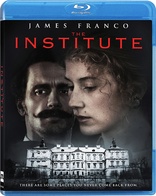The Institute Blu-ray Movie
HomeThe Institute Blu-ray Movie 
Momentum Pictures | 2017 | 92 min | Rated R | Apr 04, 2017Movie rating
6.5 | / 10 |
Blu-ray rating
| Users | 0.0 | |
| Reviewer | 2.0 | |
| Overall | 2.0 |
Overview
The Institute (2017)
Subjected to bizarre and increasingly violent pseudo-scientific experiments in personality modification, brainwashing and mind control, Isabel Porter must escape the clutches of the Rosewood Institute and exact her revenge, or else be forever lost.
Starring: James Franco, Pamela Anderson, Josh Duhamel, Eric Roberts, Lori SingerDirector: Pamela Romanowsky, James Franco
| Horror | 100% |
Specifications
Video
Video codec: MPEG-4 AVC
Video resolution: 1080p
Aspect ratio: 1.78:1
Original aspect ratio: 1.85:1
Audio
English: DTS-HD Master Audio 5.1
English: Dolby Digital 5.1
Subtitles
English SDH
Discs
Blu-ray Disc
Single disc (1 BD)
Playback
Region A (B, C untested)
Review
Rating summary
| Movie | 2.0 | |
| Video | 4.0 | |
| Audio | 4.0 | |
| Extras | 0.0 | |
| Overall | 2.0 |
The Institute Blu-ray Movie Review
Reviewed by Jeffrey Kauffman July 27, 2017It’s hard not to watch The Institute and think of other films with heroic if troubled women trying to survive in the “wilds” of a state mental institution. The Snake Pit and (especially) Frances posited headstrong women suddenly thrust into a near feral “society” in a madhouse where lunatics run rampant and the doctors supposedly in charge of healing the patients come off as half crazed themselves (again, more in the case of the highly fictionalized version of Frances Farmer’s life than in the Olivia de Havilland film). Much the same approach is taken in The Institute, a film, which like Frances, is supposedly based on true events. (Anyone who has read my debunking of many of the elements in Frances will know where I stand on that whole “based on a true story” statement.) It’s hard to believe that anything along the lines of what is depicted in The Institute actually took place, but the film does have a brief coda supposedly documenting at least some nefarious activities that took place in Baltimore’s real life Rosewood Institute, which is the ostensible setting for the film. That actual activity seems limited to human trafficking (at least as evidenced by what is presented in the coda itself), something that is at least alluded to in this film, whereas the “real” villainous activity in The Institute is so over the top and ultimately kind of absurd that I suspect few will be wondering (as I did long ago as a young man first seeing Frances and believing it all to be true), “How could this possibly have happened?”
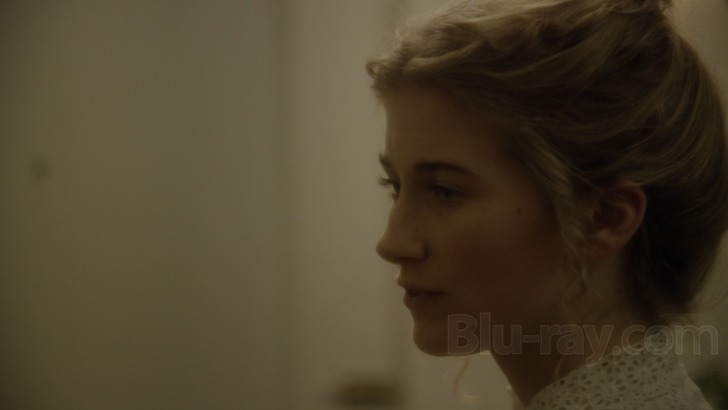
One thing that instantly sets The Institute apart from those two aforementioned films is its temporal setting. Isabel Porter (Allie Gallerani) is a 19th century woman who is struggling to deal with the sudden and unexpected deaths of her parents. Her brother Roderick (Joe Pease) knows Isabel could use a rest of some sort, but he wants to send her to Italy, per the family’s longstanding tradition, while family physician Dr. Torrington (Eric Roberts) recommends a stay at a “rest spa” catering to well to do Maryland women, the Rosewood Institute. Isabel’s tour through the facility seems to put Roderick’s fears at ease, and Isabel herself seems only too happy to check herself into the facility.
The whole 19th century context has a potent subtext of “hysteria” as a typically female ailment (one etymologically related to women, of course), and some may think of more whimsical treatments of this basic plot point in such plays as In the Next Room. There’s no actual sexual dysfunction in Isabel, at least to start with, and it’s an interesting twist on the typical presentation of 19th century mental health techniques to have Dr. Cairns (James Franco, who also co-directed) more or less spouting some proto-feminist verbiage while suggesting that part of Isabel’s “problem” is that she isn’t free enough, something that certainly does portend a sexual element.
Had The Institute posited a libertine doctor in charge of a bunch of supposedly troubled women, the film might have been able to address a number of interesting issues that confronted 19th century females, especially those perceived as “suffering” from some kind of psychological ailment. Instead, the film tips over into a weird subplot featuring a near Satanic coven that is drugging the patients and engaging in role playing games that (most bizarrely of all) allude to the writing of Nathaniel Hawthorne. Even this element might have afforded some interesting analysis of female gender stereotypes in works like The Scarlet Letter, but this is another largely unaddressed puzzle piece in a screenplay filled to the brim with interesting concepts, few of which are adequately developed. (Another literary allusion points to Edgar Allan Poe, another seemingly ripe opportunity to mine unsettled psychological content, but it's played mostly for shock value here.)
Anyone who is familiar with the often horrifying “treatments” proffered at state (and, frankly, private) institutions through the years may find the most frightening aspects of this film the apparently archival photos which underlie the credits sequence. Those photos show a variety of patently hideous devices that quite readily suggest that Man’s (or even men’s) attempts to understand the vagaries of the female mind have been as troubled as any problems males have imagined females to be experiencing. The “treatments” on hand in The Institute are so bizarrely over the top that they may in fact invite unintentional laughter rather than any feeling of dread.
Franco and co-director Pamela Romanowsky have a long history together, and they’ve created a film that has some striking visuals along with a definite mood, but the actual writing (by Adam and Matt Rager) is so frequently arch and artificial, and some of the plot conceits so outlandish, that the film wallows in a faux Gothic sensibility rather than truly exploiting elements that could have been quite unsettling. The cast, which also includes Josh Duhamel, Lori Singer and even Pamela Anderson (in a brief cameo), tries to do what they can with this overheated and yet undercooked stew, but a film about the real life scandal in Rosewood’s history might have been a more riveting film experience.
The Institute Blu-ray Movie, Video Quality 
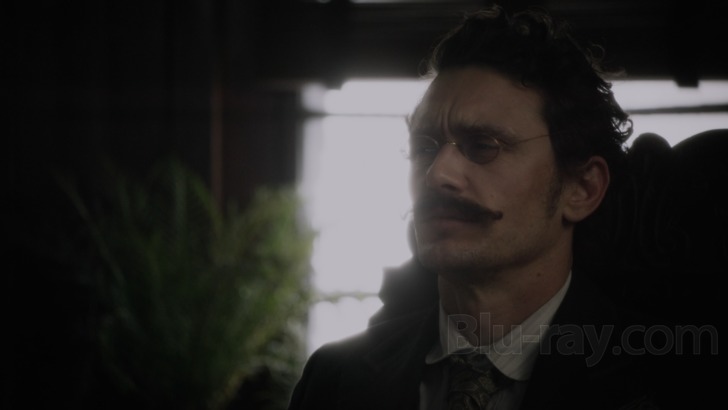
The Institute is presented on Blu-ray courtesy of Momentum Pictures with an AVC encoded 1080p transfer in 1.78:1. The film's closing credits list the RED Camera, but this presentation is a good deal softer than is typically seen in digital captures with RED technologies, something that I am assuming was a deliberate stylistic choice. The entire film is kind if gauzy looking, an aspect that is only increased by a tendency to shoot directly at effulgent light sources where there can be effulgent glows around characters and where at times whites tend to bloom (you can see some examples in screenshots 2, 9 and 12). That, coupled with a lot of material that takes place in very dimly lit and at times downright dark environments, tends to keep fine detail levels at least slightly tamped down. The palette also looks slightly desaturated most of the time, another (presumed) stylistic choice that is perhaps meant to evoke 19th century photographs. The prevalence of dark sequences can also reveal a smattering of noise (see screenshot 19). In some of the less frequent brightly lit outdoor sequences, detail levels rise considerably even if the palette continues to look a bit on the wan side.
The Institute Blu-ray Movie, Audio Quality 
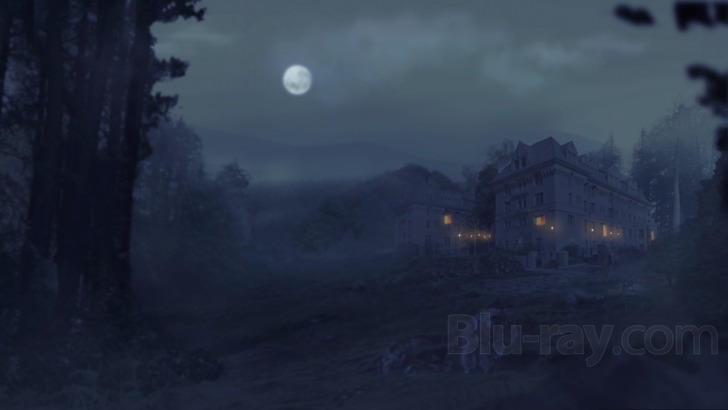
The Institute features a lossless DTS-HD Master Audio 5.1 track which regularly places individual effects rather nicely throughout the surround channels, whether or not the film is outdoors, where ambient environmental sounds predominate, or (more frequently) in the cloistered confines of the Rosewood Institute itself, where somewhat spookier sounds emanate. The film is refreshingly free of jump cuts with attendant booming LFE, and so this tends to be a more subtle listening experience than many horror infused outings. Dialogue and score both resonate clearly, and prioritization is well delivered on this problem free track. For the record, Momentum has also included a lossy Dolby Digital 5.1 track as well.
The Institute Blu-ray Movie, Special Features and Extras 
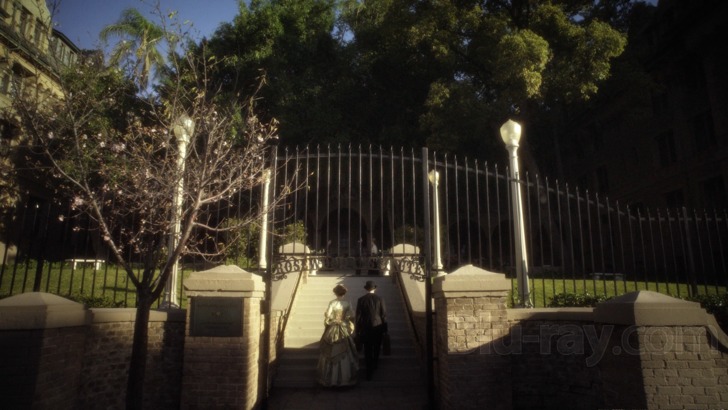
There are no supplements included on this Blu-ray disc.
The Institute Blu-ray Movie, Overall Score and Recommendation 

I seem to be in a kind of rut with a bunch of recent titles in my review queue, all of which had really interesting foundational elements, but none of which ever really fully exploited them or delivered a completely satisfactory viewing experience. The Institute is another film stuffed to the gills with undeniably fascinating concepts, but instead of concentrating on the idea of control and gender roles, the film tips over into an almost gonzo plot that seems to be even further divorced from "based on a true story" than Frances was — and (for me anyway) that's saying a lot. Fans of Franco may want to check this out, since the actor also co-directed, and for those folks, technical merits are generally very good.
Similar titles
Similar titles you might also like
(Still not reliable for this title)

Shock
Schock / Beyond the Door II
1977

Fear Clinic
2014

Gothic
1986

Death Bed: The Bed That Eats
1977

The Wind
2018

Black Sabbath
AIP Cut | 60th Anniversary
1963

The Queen of Spades
1949

Jessabelle
2014

The Boy
2016

The Quiet Ones
2014

The Turning
2020

The Phantom of the Opera
1989

Bad Dreams
1988

Demons of the Mind
Blood Evil / Blood Will Have Blood / Nightmare of Terror
1971

Dead of Night
1945

The Body Snatcher
1945

Oculus
2013

Stonehearst Asylum
Eliza Graves
2014

Winchester
2018

Gwen
2018
